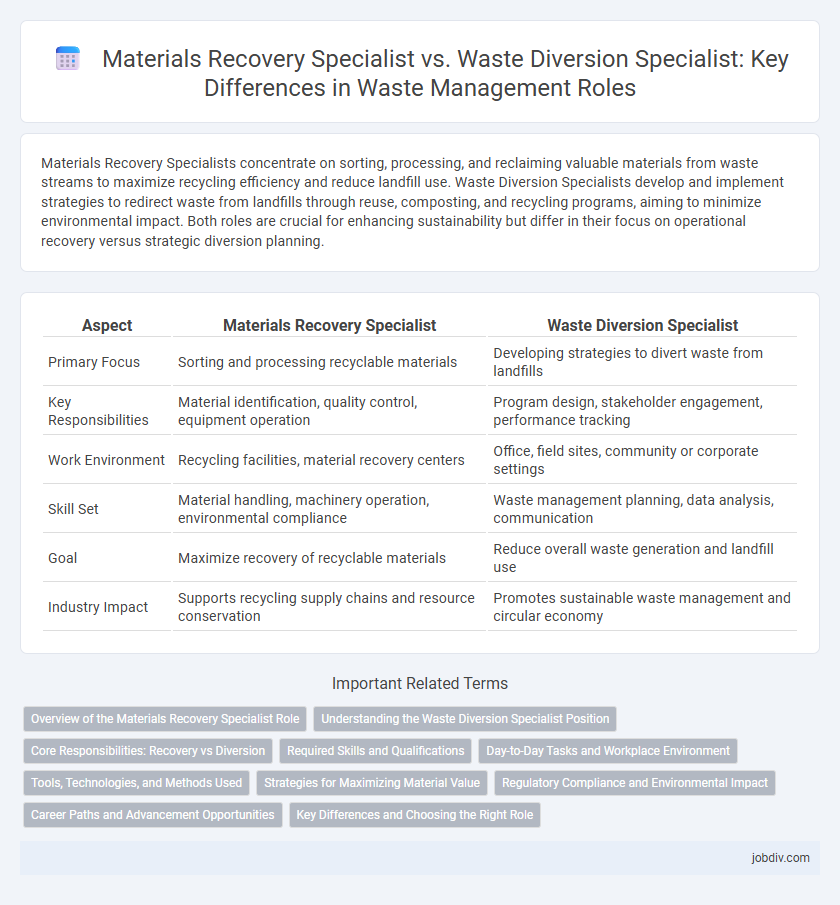Materials Recovery Specialists concentrate on sorting, processing, and reclaiming valuable materials from waste streams to maximize recycling efficiency and reduce landfill use. Waste Diversion Specialists develop and implement strategies to redirect waste from landfills through reuse, composting, and recycling programs, aiming to minimize environmental impact. Both roles are crucial for enhancing sustainability but differ in their focus on operational recovery versus strategic diversion planning.
Table of Comparison
| Aspect | Materials Recovery Specialist | Waste Diversion Specialist |
|---|---|---|
| Primary Focus | Sorting and processing recyclable materials | Developing strategies to divert waste from landfills |
| Key Responsibilities | Material identification, quality control, equipment operation | Program design, stakeholder engagement, performance tracking |
| Work Environment | Recycling facilities, material recovery centers | Office, field sites, community or corporate settings |
| Skill Set | Material handling, machinery operation, environmental compliance | Waste management planning, data analysis, communication |
| Goal | Maximize recovery of recyclable materials | Reduce overall waste generation and landfill use |
| Industry Impact | Supports recycling supply chains and resource conservation | Promotes sustainable waste management and circular economy |
Overview of the Materials Recovery Specialist Role
A Materials Recovery Specialist focuses on the efficient sorting and processing of recyclable materials to maximize resource reclamation and minimize landfill waste. This role requires expertise in identifying various materials, operating recovery equipment, and implementing quality control measures to ensure high recovery rates. Their work directly supports environmental sustainability by enhancing recycling system effectiveness and reducing overall waste generation.
Understanding the Waste Diversion Specialist Position
A Waste Diversion Specialist focuses on developing and implementing strategies to reduce landfill waste through recycling, composting, and reuse initiatives, optimizing materials recovery processes. This role requires expertise in environmental regulations, waste characterization, and data analysis to increase diversion rates effectively. Unlike Materials Recovery Specialists who concentrate primarily on sorting and processing recyclable materials, Waste Diversion Specialists integrate broader waste management policies aimed at sustainability and resource conservation.
Core Responsibilities: Recovery vs Diversion
Materials Recovery Specialists focus on the efficient extraction and processing of recyclable materials from waste streams, ensuring maximum reclamation of valuable resources such as metals, plastics, and paper. Waste Diversion Specialists develop and implement strategies to redirect waste from landfills through programs like composting, recycling initiatives, and material reuse, targeting overall waste reduction. Both roles collaborate to optimize sustainability efforts, but the former prioritizes reclaiming materials, while the latter emphasizes preventing waste generation and landfilling.
Required Skills and Qualifications
Materials Recovery Specialists require expertise in sorting technologies, knowledge of recycling processes, and proficiency in operating recovery machinery, with qualifications typically including a certification in waste management or environmental science. Waste Diversion Specialists need deep understanding of waste reduction strategies, regulatory compliance, and program development skills, often holding degrees in environmental policy or sustainability. Both roles demand strong analytical abilities, problem-solving skills, and experience with data tracking systems to optimize waste processing and diversion outcomes.
Day-to-Day Tasks and Workplace Environment
Materials Recovery Specialists focus on sorting, processing, and managing recyclable materials within facilities such as recycling plants or waste transfer stations, ensuring efficient recovery of resources. Waste Diversion Specialists develop and implement strategies to reduce landfill waste through community programs, education, and policy compliance, often working in office settings or directly with public and private stakeholders. Both roles require attention to detail and knowledge of waste regulations, but Materials Recovery Specialists engage more in hands-on sorting activities, while Waste Diversion Specialists emphasize planning and outreach.
Tools, Technologies, and Methods Used
Materials Recovery Specialists use advanced sorting technologies such as near-infrared sensors, optical sorters, and automated conveyor systems to identify and separate recyclables from waste streams efficiently. Waste Diversion Specialists employ comprehensive waste audit tools, data analytics software, and community engagement platforms to design and implement programs that reduce landfill reliance through source reduction and reuse initiatives. Both roles utilize environmental management systems and reporting tools to track diversion rates and improve sustainable waste handling practices.
Strategies for Maximizing Material Value
Materials Recovery Specialists optimize sorting technologies and implement advanced processing methods to enhance the purity and marketability of recyclable materials, increasing overall material value. Waste Diversion Specialists develop comprehensive programs that focus on waste reduction through source separation, reuse initiatives, and community engagement to minimize landfill dependency and maximize resource recovery. Both roles leverage data analytics and sustainable procurement practices to drive continuous improvement in material efficiency and circular economy outcomes.
Regulatory Compliance and Environmental Impact
Materials Recovery Specialists focus on optimizing the extraction of recyclable materials from waste streams to maximize resource recovery and ensure compliance with recycling regulations such as the Resource Conservation and Recovery Act (RCRA). Waste Diversion Specialists develop and implement programs that reduce landfill disposal through strategies aligned with local mandates like the Zero Waste Initiative and measure environmental impact via greenhouse gas emission reductions. Both roles are crucial for meeting EPA standards, minimizing ecological footprints, and advancing sustainable waste management practices.
Career Paths and Advancement Opportunities
Materials Recovery Specialists focus on sorting, processing, and optimizing recyclable materials, enhancing efficiency in waste management facilities. Waste Diversion Specialists develop and implement strategies to reduce landfill contributions through recycling, composting, and reuse programs, often leading to roles in environmental policy and program management. Career advancement for Materials Recovery Specialists may include supervisory positions in materials processing, while Waste Diversion Specialists can progress into strategic leadership roles within sustainability and environmental compliance sectors.
Key Differences and Choosing the Right Role
Materials Recovery Specialists focus on sorting and processing recyclable materials to maximize resource reclamation, while Waste Diversion Specialists design and implement strategies to reduce overall waste sent to landfills through reuse, recycling, and composting programs. The key differences lie in their scope: recovery specialists handle operational recycling processes, whereas diversion specialists emphasize strategic planning and community engagement to minimize waste generation. Choosing the right role depends on whether one prefers hands-on material management or broader waste reduction policy development.
Materials Recovery Specialist vs Waste Diversion Specialist Infographic

 jobdiv.com
jobdiv.com